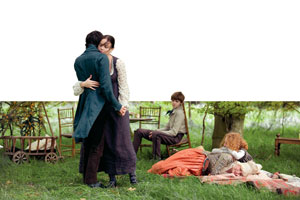 |
Jane Campion astonished the world with her sublime film The Piano – in 1993, a film that won her the Palme d'Or that year at Cannes, and got her nominated in the 'Best Director' category for the Oscars. She was, at that point in time, only the second woman who had been nominated. Campion's exquisite sensibility is unique and her films are all singularly original. All of them resonate with her hallmarks- gorgeous cinematography, and a certain kind of mystery and romance that is hard to pinpoint. Some directors are instinctively able to create an indelible atmosphere within their films - Campion is one of them.
It was only in 2009, with a few films in between and then a bit of a hiatus in filmmaking that Bright Star was released. It was first shown at Cannes that year, and while it was liked, it did not win any awards. This is indeed a shame because the film is one of the best of that year, and as some years are good, and others lamentable, let me qualify by saying that Bright Star is an incredibly fine film for any year.
The film centers on the poignant love story between the romantic poet John Keats and the love of his life Fanny Brawne. As most people know, Keats, now revered as one of the most talented of the Romantic Poets, died at 25, destitute, his talent under-appreciated by critics but worshipped by his friends and fellow poets.
Even as one goes into the film knowing there will be a tragic end, the story is so beautifully filmed, the characters so engaging, and the love story so very tender that it is impossible to be unmoved. The film is often punctuated by Keats's ravishing poetry - recited in the film by most of the characters without an ounce of pretention, which is astounding given the heavy nature of the poems and their subject matter.
Fanny, played by the often under-rated Abbie Cornish, is wonderful as the witty, independent girl who is not ashamed to defend her own art (she is an extremely talented seamstress and needlewoman) against Keats's friend and benefactor Mr Brown (played to unctuous perfection by Paul Schneider) who is obviously possessive about Keats and fears Fanny might lead him astray (from his poetry).
Ben Whishaw plays Keats with brightness in his eyes and a frailty to his physique that is both captivating and painful to watch. This wonderful cast is rounded off by Kerry Fox as Mrs Brawne, Fanny's warm-hearted mother; Edie Martin and Thomas Brodie-Sangster complete the Brawne family as Fanny's adorable little red-haired sister 'Toots' and loyal, sensitive, violin playing brother Samuel.
It is with a wrench that one leaves this little world of Campion's making where there is tragedy and death, yes, but also beauty and love, where people speak in full sentences and with wit and sincerity. When Mr Brown sends a valentine card to Fanny to belittle her, Keats is beside himself when he learns of it. While confronting his friend who continues to disparage Fanny, Keats utters, "There is a holiness to the heart's affections. Know you nothing of that?".
In any other film, the audience might have burst out laughing at the line. In Bright Star we rejoice at the sentiment instead.
This film is a love story in the truest sense of the word, there are no glib happy endings and no one miraculously comes back to life. Keats's love letters to Fanny Brawne are easily available online. They haunted Campion for so many years that she made a film about them. For their readers today they are an unforgettable reminder of the ability of words to live on in the mind even after death.
All DVDs reviewed in this column are available at:Music and Expression, Thamel, Phone # 014700092


